Could never quite see the attraction with Jenny Agutter. I
never found her a very convincing actress, although her prime and proper
demeanour suited the part of Roberta in the BBC’s adaptation of Edith Nesbit’s
children’s classic The Railway Children
in 1968, a role she repeated in Lionel Jeffries feature film version in 1970.
Nicolas Roeg’s Walkabout (1971) was a
worthy attempt to play a teenage schoolgirl stranded in the Australian outback
with her young brother. But her role in David Greene’s dull attempt at a psychological
thriller I Start Counting (1969) was miscast. Her part as an adopted
fourteen-year-old catholic schoolgirl Wynne (she was sixteen at the time) who
falls in love with her older “brother” George (Bryan Marshall) and goes on to
accept the fact that he could be a serial killer is not convincing and a
stronger more assertive actress might has made the character more plausible.
Adapted from Audrey Erskine Lindop’s novel by Richard Harris
it’s a long way from the swinging London of Green’s Sebastian
(1968) in both story and location. Filmed in Bracknell, Berkshire we discover
that Wynne is infatuated with her older brother who is twenty years her senior
but she assumes that because she is adopted that falling in love him is
acceptable - sending jailbait sexuality
to the very borders of incest! Wynne’s family has moved from a rather
picturesque cottage located on the edge of a common to a clinical looking flat
in a concrete tower in the sky. It’s on the common that bodies of two young
girls have been found murdered. After witnessing George dispose of a blood
stained woolly in a waste bin she begins to suspect him of being involved in
the killings. This suspicion does nothing to cool her feelings for her brother,
although she starts to question his whereabouts and to follow him discovering
there’s more to Georgie boy than meets the eye. Two of the films characters
remind you what era we are in, firstly there’s Wynne’s best friend Corinne
(Clare Sutcliffe), who according to the local clippie (Simon Ward’s first major
role) ‘wears her skirts way too short’, has great fun flirting with George in
front of her best friend but when he turns on her she looses interest pretty
quick! The second character is the younger brother Len (Gregory Phillips) who
keeps a scrapbook of press cuttings about the murders, has a longhaired friend
(Michael Feast who you will no doubt recognise from Private Road 1971) who supplies him
with dubious looking ‘pills’.
The movie did raise a few hackles at the time of release
because of the suggestion of underage sex, or at least the sexual feelings of a
fourteen year old. Although credit to Green for not making Agutter appear as a
sex object, in fact unlike Corinne, she is quite a plain Jane, her beauty
hidden beneath pleated skirts, knee high socks and thick jumpers most of the
time. It’s a soft whimsical thriller that lacks bite, with a soundtrack to match.
Having never read the novel, I’m not sure if it’s the story that’s weak or
David Greene’s direction.















